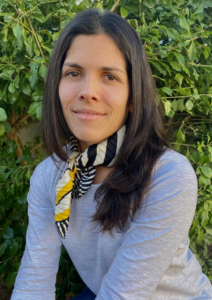 Abi Nardi
Abi Nardi
Licenciada en Fonoaudiología
Óptica contactóloga
Especialista en Audiología
Villa Dolores, Cordoba, Argentina
I am licensed to practice audiology and language therapy, a career path that takes 5 years to complete plus the final thesis in my country, Argentina. After graduating I dedicated myself to the area of audiology.
I have worked in a very prestigious hospital in a big city, and currently work in a smaller city, in a private practice and municipal clinics, knowing different social, emotional and economic realities, where each person goes through similar pathologies in different ways.
In my family I grew up learning to see the “patient” as a person first. My mother is an optometrist, and she always listened to her patients, showing me how to learn about each as persons first and what they contribute, before their pathologies.
However, in my years of the University I didn´t have, not even half a semester, a subject that taught me to LISTEN, CARE and ACCOMPANY a patient. Conversely I had the ones that taught me to carry out and understand tests, know pathologies and ways to solve them, from a purely scientific approach. I am obviously grateful because it is necessary to incorporate these topics and they are the basis of an audiologist’s college career.
But in my country it´s normal to attend patients within a certain time and try to unilaterally resolve the conditions — without remembering the environment, social, economic and emotional level of each person.
After gaining some experience, I needed to know a little more every day, to update me and learn. One day I found this website, got to know Kris English and through her the IDA Institute. I had been trying to provide patient-centered care for years in a disorganized way and without given it a name. I also had no coworkers interested in PCC, until now.
I Tell You What I Have Learned…
Person Centered Care (PCC) is a practice that is difficult to understand. It moves us from a structured job, or rather a traditional one, which is what we have been taught to exercise in a unidirectional way. I have learned that PCC proposes a more complex, dynamic professional exercise; we must be adaptable to what our patients are expressing and we must discover what they value. It means getting more involved in each consultation, paying extra attention to each situation that occurs in the meeting, managing to understand all aspects of our patient life.
There are situations that we cannot control, such as the culture where we live, that of our work, economic tools, our educational past, but nevertheless there many other situations that we can control.
I never spent hours explaining an audiogram, I have never been only theoretical; I always went further, observing whoever chose me as an audiologist, LISTENING to what he has to say, without asking closed questions, allowing freedom to express oneself. I know that it’s a unique experience each patient brings to their hearing loss, since for each one it means something different, having different thoughts, feelings and experiences according to how this loss is affecting him in his life.
Recognizing that the way we interact with our patients has a significant effect in the auditory result means we see the importance of how to build a therapeutic relationship. And so we can position ourselves as clinicians, where we not only explain options, but we must also work with the goals and values of our patients, situating ourselves with EMPATHY. We help them chart a path with a plan appropriate to what we believe best for them, according to what they explicitly and implicitly propose to us in their narratives.
What Keeps Me Going…
I will never forget a patient who entered the consultation, referred by a colleague, who described him as a patient who didn’t accept his diagnosis: profound bilateral sensorineural hearing loss.
 We sat down… no one spoke for a minute, we just looked at each other, waiting for the other to speak…when suddenly he said to me: “ How comfortable I have felt for a moment, where nobody told me what to do or how, just waited for me to decide to speak…Now I´m going to tell you…”, Then I asked a few questions, since my patient described himself without questionnaires. And I asked myself: profound hearing loss? Without any testing? It turned out to be a patient with a wrong diagnosis.
We sat down… no one spoke for a minute, we just looked at each other, waiting for the other to speak…when suddenly he said to me: “ How comfortable I have felt for a moment, where nobody told me what to do or how, just waited for me to decide to speak…Now I´m going to tell you…”, Then I asked a few questions, since my patient described himself without questionnaires. And I asked myself: profound hearing loss? Without any testing? It turned out to be a patient with a wrong diagnosis.
That encounter occurred in 2019, and since then I have treated eight patients sent by him.
This is where, through PCC, I can fully appreciate what to do with this information and how to take advantage of it. Today I feel supported, accompanied, on track, I found academic training on the subject, I found those who gave it a “frame”
I Know that it’s in me and in every professional who wants it, the ability to respond to the emotions that derive from the hearing loss of our patients.
With these insights, I try to encourage colleagues to get involved and soak up this knowledge that is very simple to implement but complexly difficult to apply, especially if we don’t manage to deconstruct our way of looking the traditional clinician-patient relationship.
I understand the added value that we can achieve, but the structures of traditional education don’t put in value, hence it’s difficult to see and adopt it. The important thing is that if we manage to move from the traditional approach and adopt this way of working, we’ll quickly see that benefits are found for both parties: we manage to improve the patient’s health and we as professionals will have fidelity on their part. The idea of building loyalty to our patients, listening to them, making them feel at ease beyond getting involved in their problems and trying together to reach the best possible option for their condition. Simply by using the responsible practice of PCC.
Here is the future of our way of working effectively, responding to the global need of each person.
